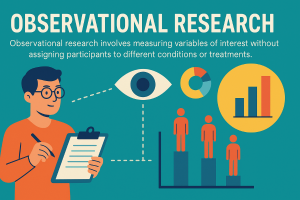The Brookbush Institute Publishes a NEW Glossary Term: 'Observational Research'
The Brookbush Institute continues to enhance education with new courses, a modern glossary, an AI Tutor, and a client program generator.
Observational research may be ideal when an independent variable is impractical, unethical, or unsafe to assign experimentally (e.g., assessing the risk of injury associated with a phenomenon).”
NEW YORK, NY, UNITED STATES, September 3, 2025 /EINPresswire.com/ -- Excerpt from Glossary Term: Observational Research— Dr. Brent Brookbush, CEO of Brookbush Institute
- Additional Glossary Term: Experimental Research
- Related Courses: Athletic Training Continuing Education
DEFINITION
Observational Research: Observational research is a study design in which researchers do not actively manipulate variables but instead observe and measure naturally occurring relationships between exposures (independent variables) and outcomes (dependent variables). Unlike experimental research , which introduces interventions under controlled conditions, observational research documents associations as they occur in real-world settings. While this design is less definitive for establishing causality, it often provides stronger external validity and captures effects that may not be feasible, ethical, or practical to test experimentally.
SEMANTIC CLARIFICATION
“Observational” indicates that researchers observe and measure variables without imposing experimental conditions.
“Research” emphasizes the systematic, replicable collection and analysis of data aimed at answering a predefined question or hypothesis.
Applied Example
- Research Question: Does knee valgus predict future knee injury?
- Observational Research Design: A prospective cohort study screens athletes for knee valgus alignment at baseline and then follows them through a competitive season. Injury incidence is recorded and compared between athletes with and without valgus alignment.
- Why Observational Research is Most Appropriate: An experimental trial deliberately introducing knee valgus would be unethical, since researchers cannot knowingly expose participants to potentially harmful conditions. However, because knee valgus naturally occurs in some athletes, simply identifying and comparing these athletes allows researchers to study risk factors without introducing risk.
EXAMPLES
- Skou, S. T., Wrigley, T. V., Metcalf, B. R., Hinman, R. S., & Bennell, K. L. (2014). Association of knee confidence with pain, knee instability, muscle strength, and dynamic varus–valgus joint motion in knee osteoarthritis. Arthritis care & research, 66(5), 695-701. CAN'T ACCESS
- Eckard, T., Padua, D., Mauntel, T., Frank, B., Stanley, L., Begalle, R., ... & Kucera, K. (2018). Association between double-leg squat and single-leg squat performance and injury incidence among incoming NCAA division I athletes: A prospective cohort study. Physical Therapy in Sport.
- Hewett, T. E., Myer, G. D., Ford, K. R., Heidt, R. S., Colosimo, A. J., McLean, S. G., & Succop, P. (2005). Biomechanical measures of neuromuscular control and valgus loading of the knee predict anterior cruciate ligament injury risk in female athletes A prospective study. The American journal of sports medicine, 33(4), 492-501.
- Ramskov, D., Barton, C., Nielsen, R. O., and Rasmussen, S. (2015). High Eccentric Hip Abduction Strength Reduces the Risk of Developing Patellofemoral Pain Among Novice Runners Initiating a Self-Structured Running Program: A 1-Year Observational Study. Journal of orthopaedic and sports physical therapy, 45(3), 153-161
- Leetun, D., Ireland, M., Willson, J., Ballantyne, B., Davis, I. (2004). Core stability measures as risk factors for lower extremity injury in athletes. Medicine and Science in Sports and Exercise, 36(6), 926-934.
Strengths and Limitations of Observational Research
STRENGTHS
- Observational research may be ideal when an independent variable is impractical, unethical, or unsafe to assign experimentally (e.g., assessing the risk of injury associated with a phenomenon).
- Observational research may also be ideal for studying long-term effects, rare outcomes, and real-world variability that controlled experiments may overlook.
- Observational research may be more feasible in terms of time, cost, and participant recruitment.
LIMITATIONS
- Observational research is more susceptible to vulnerable variables, bias, and threats to internal validity.
- Observational research is a weaker form of evidence when attempting to determine causation.
- Observation research may have limited generalizability and comparability across groups due to a lack of randomization or controlled assignment.
TYPES OF OBSERVATIONAL RESEARCH...
FOR THE FULL TEXT AND SO MUCH MORE, CLICK ON THE LINK
Brent Brookbush
Brookbush Institute
Support@BrookbushInstitute.com
Visit us on social media:
LinkedIn
Instagram
Facebook
YouTube
TikTok
X
Other
Legal Disclaimer:
EIN Presswire provides this news content "as is" without warranty of any kind. We do not accept any responsibility or liability for the accuracy, content, images, videos, licenses, completeness, legality, or reliability of the information contained in this article. If you have any complaints or copyright issues related to this article, kindly contact the author above.

